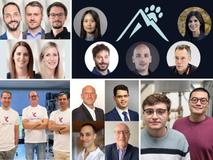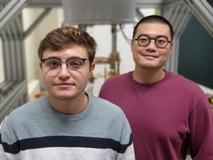CHF 10,000 for an innovative platform that empowers teachers, agentic physical AI for general robotics, a novel in-vivo gene editing platform, orthopedic surgery with robotic flexible articulation, and next-gen electronics for cryogenic environments
06.11.2025
aprendo, Binabik, Immitra Bio, Medical Wizardry, and Rhonexum were selected at Venture Kick's first stage of financial and entrepreneurial support. Their projects empower teachers to master digital education; build agentic physical AI for general robotics; develop a novel in-vivo gene-editing platform; create a robotic platform that improves precision and dexterity with an articulating bone-cutting instrument; and embrace cryogenic electronics.
 |
 aprendo: CEO Georg Winker, Lead Developer Nermin Elkasovic, Lead Developer Nicholas Ingulfsen, COO Karin Dedic, CLO Andrea Kern
|
 Binabik: Co Founders Lei Fu, Giovanni Tofetti, Jorge Peña, Harry Edelman, and Sahar Salimpour
|
 Immitra Bio: Jan Nelis (CEO), Prof. Jacob Corn (Scientific Advisor), and Amir Taheri (CSO)
|
 Medical Wizardry: CEO Louis Jauvtis, Chief Medical Officer Daniel Wiznia, Student Assistant Riaan Kaempfer, and Master Machinist Jean-Rene Monnerat
|
 Rhonexum: CEO Vicente Carbon and CTO Hung-ChiHan
|
aprendo AG: empowering teachers to master digital education
Educators are increasingly overwhelmed by the fast-paced digital transformation and the way it reshapes the teaching profession. Without effective, scalable training, teachers fall behind – leaving students underprepared for the digital future and widening the skills gap in education and society.
Founded in 2025 as a spin-off from the University of Teacher Education St. Gallen, aprendo AG – led by CEO Georg Winder, CLO Andrea Kern, COO Karin Dedic, and Lead Developers Nermin Elkasovic and Nicholas Ingulfsen – has developed aprendo.ch, an innovative platform that empowers teachers to build digital skills through flexible, practice-based learning. By combining pedagogical expertise with cutting-edge technology, aprendo.ch transforms how schools and educators enhance their digital competence. The platform offers up-to-date modules (e.g., various modules on AI) essential for teachers’ daily work with students and serves as a strategic tool to guide schools’ digital development. With a market of over 1.2 million teachers in German-speaking countries, it addresses a critical global need for scalable digital education. It helps prepare students for a fast-evolving digital world.
The Venture Kick funds will be used for product and AI development, as well as for scaling up and commercialization.
Binabik: Building Agentic Physical AI for General Robotics
Today’s approach to monolithic and increasingly large foundation models in humanoids faces generalization, scalability, and sustainability challenges, as it relies on costly human demonstration samples. Agentic AI has shown significant value in the digital domain, from agentic browsers to computer use agents; the same paradigm has yet to be applied to AI agents that interact with the physical world.
Founded by Dr. Jorge Peña Queralta, Dr. Harry Edelman, Dr. Giovanni Toffetti, Sahar Salimpour, and Lei Fu, Binabik is building the tooling and infrastructure that will allow for truly agentic embodied intelligence, encapsulated in an Agentic OS for Physical AI that can adapt to any robot embodiment, any task, and any environment. They are targeting the future trillion-dollar humanoid and general robotics market.
The team will use the Venture Kick funds to support market validation and further work on a prototype for piloting with key partners.
Medical Wizardry: Revolutionizing orthopedic surgery with robotic flexible articulation, real-time 3D visualization, and precision navigation.
Orthopedic surgery lacks flexible, guided tools for precisely shaping bone surfaces. Current methods often cause cartilage damage and require over 60 X-rays per procedure.
Co-founders Louis Jauvtis, a mechanical engineer, and Dr. Daniel Wiznia, an orthopedic surgeon and Yale professor, share a vision of surgical innovation and developed a robotic platform that improves precision and dexterity with an articulating bone-cutting instrument. The Co-Founders include Jean-Rene Monnerat, a machinist with 55 years of experience, and Riann Kaempfer, a mobile robotics student at FHGR. Through continuous position tracking and real-time 3D visualization, the innovation enhances surgical precision and control— resulting in less capsule damage, lower radiation exposure, shorter surgeries, and faster recovery. The technology targets a CHF 12 billion global arthroscopy and spinal surgery market.
The Venture Kick funds will be used for prototype and business development, marketing, incorporation, and early patent protection.
Rhonexum: Embracing Cryogenic Electronics
Scaling quantum computers to millions of qubits is limited by the need for reliable control at cryogenic temperatures. Current architectures rely on room-temperature electronics and extensive wiring, generating excess heat and complexity. Rhonexum enables scalable cryogenic electronics to overcome this bottleneck.
Founded in 2024 as a spin-off project from EPFL, Rhonexum is led by CEO Vicente Carbon and CTO Dr. Hung-Chi Han, supported by circuit designer Enci Zhang and advisors Prof. Christian Enz and Prof. Edoardo Charbon. Leveraging its core technology, RX-MODEL—a physics-based SPICE model optimized for operation down to -270 °C—the team develops next-generation electronics for cryogenic environments. This innovation bridges a critical gap for the fast-growing quantum computing and cryogenic semiconductor markets, expected to exceed USD 6 billion. Rhonexum’s technology will enable quantum computing companies to scale qubit numbers using integrated circuits that minimize wiring and system footprint.
Venture Kick funds will be used to finalize RX-MODEL validation with key partners, develop integration workflows with major EDA tools, and expand Rhonexum’s client base among quantum computing companies.
Educators are increasingly overwhelmed by the fast-paced digital transformation and the way it reshapes the teaching profession. Without effective, scalable training, teachers fall behind – leaving students underprepared for the digital future and widening the skills gap in education and society.
Founded in 2025 as a spin-off from the University of Teacher Education St. Gallen, aprendo AG – led by CEO Georg Winder, CLO Andrea Kern, COO Karin Dedic, and Lead Developers Nermin Elkasovic and Nicholas Ingulfsen – has developed aprendo.ch, an innovative platform that empowers teachers to build digital skills through flexible, practice-based learning. By combining pedagogical expertise with cutting-edge technology, aprendo.ch transforms how schools and educators enhance their digital competence. The platform offers up-to-date modules (e.g., various modules on AI) essential for teachers’ daily work with students and serves as a strategic tool to guide schools’ digital development. With a market of over 1.2 million teachers in German-speaking countries, it addresses a critical global need for scalable digital education. It helps prepare students for a fast-evolving digital world.
The Venture Kick funds will be used for product and AI development, as well as for scaling up and commercialization.
Binabik: Building Agentic Physical AI for General Robotics
Today’s approach to monolithic and increasingly large foundation models in humanoids faces generalization, scalability, and sustainability challenges, as it relies on costly human demonstration samples. Agentic AI has shown significant value in the digital domain, from agentic browsers to computer use agents; the same paradigm has yet to be applied to AI agents that interact with the physical world.
Founded by Dr. Jorge Peña Queralta, Dr. Harry Edelman, Dr. Giovanni Toffetti, Sahar Salimpour, and Lei Fu, Binabik is building the tooling and infrastructure that will allow for truly agentic embodied intelligence, encapsulated in an Agentic OS for Physical AI that can adapt to any robot embodiment, any task, and any environment. They are targeting the future trillion-dollar humanoid and general robotics market.
The team will use the Venture Kick funds to support market validation and further work on a prototype for piloting with key partners.
Immitra Bio: Developing a novel in-vivo gene editing platform
Currently approved and clinical blood stem cell therapies rely on editing cells outside the body (ex-vivo). This involves extracting stem cells from the patient, editing them individually at specialized manufacturing facilities, administering high-dose chemotherapy to destroy existing bone marrow, and then transplanting the corrected cells back. The process is inherently unscalable, toxic, and lengthy, often taking six months to a year.
Immitra Bio develops a novel in-vivo gene editing platform that reduces treatment time from months to days, eliminates the need for chemotherapy, and is delivered as an off-the-shelf drug that all patients with the same condition can receive. Their therapy enables a safe, fast, and truly scalable approach to gene correction.
The team will use the Venture Kick funds to strengthen Immitra Bio’s intellectual properties and prototype development.
Orthopedic surgery lacks flexible, guided tools for precisely shaping bone surfaces. Current methods often cause cartilage damage and require over 60 X-rays per procedure.
Co-founders Louis Jauvtis, a mechanical engineer, and Dr. Daniel Wiznia, an orthopedic surgeon and Yale professor, share a vision of surgical innovation and developed a robotic platform that improves precision and dexterity with an articulating bone-cutting instrument. The Co-Founders include Jean-Rene Monnerat, a machinist with 55 years of experience, and Riann Kaempfer, a mobile robotics student at FHGR. Through continuous position tracking and real-time 3D visualization, the innovation enhances surgical precision and control— resulting in less capsule damage, lower radiation exposure, shorter surgeries, and faster recovery. The technology targets a CHF 12 billion global arthroscopy and spinal surgery market.
The Venture Kick funds will be used for prototype and business development, marketing, incorporation, and early patent protection.
Rhonexum: Embracing Cryogenic Electronics
Scaling quantum computers to millions of qubits is limited by the need for reliable control at cryogenic temperatures. Current architectures rely on room-temperature electronics and extensive wiring, generating excess heat and complexity. Rhonexum enables scalable cryogenic electronics to overcome this bottleneck.
Founded in 2024 as a spin-off project from EPFL, Rhonexum is led by CEO Vicente Carbon and CTO Dr. Hung-Chi Han, supported by circuit designer Enci Zhang and advisors Prof. Christian Enz and Prof. Edoardo Charbon. Leveraging its core technology, RX-MODEL—a physics-based SPICE model optimized for operation down to -270 °C—the team develops next-generation electronics for cryogenic environments. This innovation bridges a critical gap for the fast-growing quantum computing and cryogenic semiconductor markets, expected to exceed USD 6 billion. Rhonexum’s technology will enable quantum computing companies to scale qubit numbers using integrated circuits that minimize wiring and system footprint.
Venture Kick funds will be used to finalize RX-MODEL validation with key partners, develop integration workflows with major EDA tools, and expand Rhonexum’s client base among quantum computing companies.


